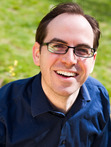Adam Szymkowicz's Blog, page 91
July 12, 2012
I Interview Playwrights Part 478: Carlos Murillo
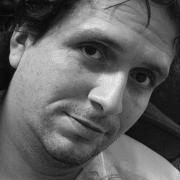
Carlos Murillo
Hometown: b. Freeport, NY. Grew up in Levittown, NY, Caracas, Venezuela, Bogota Colombia, and Garden City, NY. Spent my formative years in Brooklyn, NY.
Current Town: Chicago, IL
Q: What are you working on now?
A: A bunch of stuff - just put the finishing touches on a revision on A THICK DESCRIPTION OF HARRY SMITH, based on a workshop production we just did with P73 - and also actively looking for a place to do a longer run in NYC and elsewhere. In the process of writing/trying to finish a commission for Steppenwolf - which is about a literary hoax. Also beginning work on my first TYA play for Adventure Stage here in Chicago - we're working closely with the community served by the Northwestern Settlement House where the theatre is located. That piece is scheduled for production in April 2013. I am also a teacher - I head the BFA Playwriting Program at The Theatre School of DePaul University, which is an on-going work-in-progress.
Q: Tell me, if you will, a story from your childhood that explains who you are as a writer or as a person.
A: I was a notorious underachiever in grade school. In sixth grade I decided I would only do homework assignments that interested me, everything else I would only put in a half-hearted effort, turn in late, or simply not do at all. The stuff that jazzed me were projects that involved some sort of creative effort - I would put my entire self into them at the expense of everything else. I loved doing things that involved glue, magic markers, clay, cutting out images from magazines, blowing things up.... My 6th grade teacher, Ms. Jural, was kind of evil. I remember she wore her long grey hair in a tight braid, and she peered over her bifocals at the class with unmasked condescension bordering on hatred. It was clear then as it is to me now that teaching 6th grade was a form of condemnation for her.
One day she gave us an assignment to write a short story on any subject. Out of character for her, as most of the work she assigned us triggered in me a feeling of paralysis. This one, though... my mind exploded and I let my imagination run wild every available hour that week (at the expense of all other homework) concocting a crazed tale of a rogue worker at a NYC burger joint who chemically altered a cheeseburger so that it would grow to enormous proportions and wreck havoc on New York City. (I borrowed liberally, if semi-consciously, from Attack of the Killer Tomatoes, which I had just seen for the first time.)
The day the story was due, Ms. Jural had each of the students read their stories. I could not wait to be called on - I reveled in the chance to share this early product of my imagination with my classmates. They ate it up - laughed in all the right places.... their responses grew more vocal, more rowdy in proportion to the outrageousness of the story as it unfolded - by the end, things got a little out of hand... I hadn't intended to, but by the end of the story (which was way longer than the assignment asked - a pattern I have repeated in many of my plays) Ms. Jural had lost control of the classroom.
At the end of each story, Ms. Jural would offer a quick summary evaluation. When the chaos died down after my turn, I waited eagerly for her response, because I thought I had done so well. Her response? One word: "Overkill." When she handed the story back a few days later, a giant letter C graced the title page.
I think that's when I became a writer.
Q: If you could change one thing about theater, what would it be?
A: I could go on for pages and pages about this. I think the majority of folks would agree that the patient is gravely ill, and unless there is a wholesale rethinking of our current producing models, we're all gonna be in a heap of trouble. For the exception of a few places like NY, Chicago, Minneapolis, LA, DC and a handful of other cities, there aren't a whole lot of places that have self-sustaining, healthy ecospheres for theatre makers and audiences. The original purpose of the regional theater system, at least as I understand it, was to plant seeds in those parts of the country where those ecospeheres were non-existent. Which would suggest that those seed theatres would function as a kind of agora specific to the community it served, where artist and audience would would be in dialogue in a very direct, community- and geography-specific way.... in other words, the regional theatres would embrace regionalism in the very best sense of the term, employing home grown artists and administrators to create work that would speak to their specific audience. Didn't turn out that way - I think the system, and the good intentions that gave rise to it, has devolved to a point where regional theatres have become similar to movie multiplexes - where old chestnuts and the hits from last year's season in NY make their rounds, where there is little to distinguish the programming theatre to theatre throughout the country, and anything that speaks directly to the concerns of the community gets lost in the shuffle. Lost in that is any real commitment to PLACE and all that that entails. And when they do generate work on their own, it's so often with an eye to future life in NY, and not the needs of their particular community. This isn't a very friendly environment for anyone to work in.
My proposal: at the end of every season in NY we can make a pretty good guess which plays will make the "most produced" list the following year in AMERICAN THEATRE. Why not follow the Broadway touring model for those plays? Put together four or five road companies that will bring those plays to all the theatres that want them. Maybe that sounds icky and too commercial - but the reality is that a good incentive to produce those plays - aside from the quality of the works themselves - is the box office cachet that comes from something that comes with the NY Times stamp of approval. I imagine (and this is probably naive on my part, as I really have no business sense) that taking this ready-made approach would free up a lot of local resources that could be channeled into fostering local talent and new work generated by and for the communities that theatres are supposed to serve. Everyone wins - people are employed, theatres sell tickets and space can be created for the unknown.
I also think the successful big theatres around the country ought to commit to developing young artists in their communities in meaningful ways - Steppenwolf is doing this with great success through their Garage Rep series. Each year they throw the door open for small, young companies (most of which are the spiritual descendants of the "adrenaline, gaffer tape and a dream" model of the original Steppenwolf that started in a church basement) to produce a rotating repertory of shows. It's hugely successful - and mutually beneficial: the small companies get a bump up for being annointed by Steppenwolf and learn a thing or two about producing in the process, and Steppenwolf reaps the benefits of attracting younger audiences into their theatre, and perhaps more philosophically, they do honor to their own historical legacy by paying it forward to the next generation.
Lastly, I think the spate of new, excessive, starchitect designed buildings, complete with bridges to nowhere, that came during the illusory flush years should have sparked community-wide outrage when the world came crashing down in 2008. People rightfully raged at the banks for their gross mismanagement and absurd compensation for CEOs - why isn't there the same anger in the smaller scale world of the theatre? Millions squandered on buildings, six figure salaries for administrators, while compensation for actors, playwrights, directors and designers has remained pretty much flat - sounds to me like the theatre is not much different than latter day capitalist America. Think of the monstrous resources that went into putting those things up - I like to think that it's not the form of the building that makes the institution, but rather the contents within.
Q: Who are or were your theatrical heroes?
A: People I learned from directly that changed my life and/or shaped a lot of my thinking about what we do, and who have influenced my role as a mentor to students: Maria Irene Fornes, Morgan Jenness, Robert Woodruff, David Greenspan, Shelby Jiggetts, Eduardo Machado, Luis Alfaro, Anne Bogart, Todd London.
Then there are the historical models - Georg Buchner, Bertolt Brecht, Richard Foreman, Tadeuz Kantor, Sam Shepard, Joe Papp, Frank Wedekind, Eugene O'Neill to name a few.
Then there are non-theatrical folks whose work, to me, is a kind of theatre: David Bowie, Sex Pistols, Pink Floyd, Harry Smith, Italo Calvino, Roberto Bolano, Bob Dylan, Rem Koolhaas, Louis Sullivan, Frank Lloyd Wright, Wilhelm Reich, Terry Gilliam, Lenny Bruce, Bill Hicks, Eric Hebborn, Richard Nixon, and so on.
Q: What kind of theater excites you?
A: Theatre that makes me feel like I've LIVED through an EXPERIENCE (as opposed to OBSERVING someone else LIVE THROUGH/EXPERIENCE something)... where I feel like some essential part of me/my soul/my mind has been rewired. Where I lose the consciousness that I am watching a made thing - but going through something that forces my mind to travel great distances inward and outward - inward in the sense that my own demons are exposed, and outward in the sense that my consciousness of the impossible complexities and paradoxes of human existence is heightened. So often I watch things and I become all-too-conscious of the parts that make up the whole - the quality of writing, directing, acting, design, etc. I sometimes think that's the curse of making the stuff - it's very difficult to completely give over. Those are only partial experiences, many of which I value a great deal. However, those lived-through experiences versus those partial experiences, which feel more like observation, to me is the difference between a deep tissue massage and a casual back rub. A few examples: the recent production of ICEMAN COMETH at The Goodman Theatre - all 5 glorious, soul-destroying hours of it... Reza Abdoh's QUOTATIONS FROM A RUINED CITY... Andrei Serban's FRAGMENTS OF A GREEK TRILOGY... all of those pieces were traumatic - made me feel like my soul was in danger, that what was taking place before my eyes was like a hand forcing my mouth open, reaching in and rearranging my insides... but having gone through them I became a bigger human being, and possibly a better artist.
Q: What advice do you have for playwrights just starting out?
A:
1) Characters have bodies distinct from your own.
2) Those bodies come in all shapes, sizes, colors. They move through the world in very specific, idiosyncratic ways.
3) Those bodies are decisive in so many ways - they shape thought patterns, speech, the experience of emotion, self-perception, perception of the "other" - the whole concept of need & expression is intimately tied with the body in space.
4) A play, in many ways, is a collection of distinct bodies trapped in a space - your task is to follow the dance that ensues.
5) Your task, in writing the play, is to forget your own body, and to imagine being inside a body not your own, and honoring all the messy complexity that entails.
6) In doing so, you honor the integrity of your characters not as products of your imagination, but as actualities that exist in the world independent of you.
7) If you can honor their autonomy, they might tell you truths you'd never arrive at on your own.
8) Overwrite until your characters have said and done everything they needed to say and do. Then be merciless with yourself.
9) Forgive the brutal honesty, BUT: hundreds and hundreds of plays are written and circulated through literary offices, agencies, contest judges, publishers, grad school selection committees each year. They need another play like they need a hole in their head. Make yours COUNT. Make yours NECESSARY. Make yours something NO ONE ELSE IN THE WORLD COULD POSSIBLY HAVE WRITTEN. Make yours prove that it NEEDS TO EXIST.
10) Lastly - the first image is perfect and hopelessly imperfect. Embrace both.[image error]







Published on July 12, 2012 11:35
July 11, 2012
I Interview Playwrights Part 477: Yasmine Beverly Rana
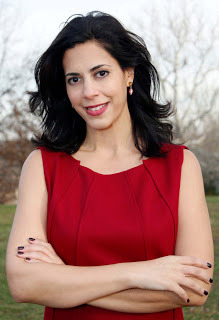
Yasmine Beverly Rana
Birthplace: New Orleans, Louisiana
Q: Tell me about The Fallen.
A: The Fallen is rooted in Sarajevo where I volunteered as a teacher and drama therapist to returning and refugee youth after the war. The city has become more than a geographical reference, but an indelible mark on my mission as a playwright, teacher, therapist, and human being. It was a profound experience that hasn't left my writer's soul. The play began in whispers: whispers to keep the story of Sarajevo alive, whispers throughout my travels to other cities connected to the conflict. I had written about the Bosnian war in previous plays, but this time I wanted to tell the story of ethnic cleansing, of the children born from the systematic rapes, but tell it through a relationship between a mother and her daughter over a span of twenty years from the beginning of the war to the current international criminal tribunals at the Hague. Nora’s Playhouse, a company I co-founded with director Caroline Reddick Lawson and Emily Richard is producing the play. It’s been a gift working with a tremendously talented group of people including producer Jenn Haltman, Jacquelyn Honeybourne, along with a powerful cast and production team.
Q: What else are you working on now?
A: My latest play Another Spring is about an intimate relationship within the turmoil of the Arab Spring. The play is an assault, an interrogation, a love affair, an exploration of democracy all within the confines of a bedroom between two lovers and a holding cell between a demonstrator and interrogator. I’m also actively working with our company, Nora’s Playhouse, helping tell the stories of women through readings and productions.
Q: Tell me, if you will, a story from your childhood that explains who you are as a writer or as a person.
A: My mother has often told the story of when I was three and taken to “audition” for admission to a nursery school. I was asked to observe the class as they sat in a circle and participated in some activity. Standing outside their circle, I watched for a moment, and then declared, not asked (as the story is told), “Room for one more,” and pushed my way into the circle to join the group. The school accepted me on the spot. There’s always room for one more play, one more interpretation, one more story to be told. Our voices as playwrights are unique, as our experiences.
Q: Who are or were your theatrical heroes?
A: The directors I’ve had the privilege of watching their magic: George Ferencz of La MaMa, Justine Lambert of The Looking Glass Theatre, John Pietrowski and James Glossman of Playwrights Theatre of New Jersey, Jatinder Verma of Tara Arts in London, and of course, Caroline Reddick Lawson of Nora’s Playhouse. I’ve learned from each one and am deeply grateful for their artistic collaboration. I’ve found inspiration from Ellen Stewart, Richard Schechner, Carol Martin, Naveen Kishore. What an honor for me to say I’ve worked with these artists and scholars. To all I say a word I often used in Sarajevo, “hvala”. Thank you!
Q: What kind of theatre excites you?
A: I’m excited by theatrical risks in content and style. I’m excited by work outside the four walls of a theatre. I’m excited by work that’s produced outside the theatre cities of London and New York. Some of the greatest theatre I’ve seen has been in a township in South Africa, an auto garage in the Czech Republic, and a stage in Cluj, Romania.
Q: What advice do you have for playwrights just starting out?
A: Don’t hang out with writers all the time. Find inspiration in other genres and experiences. Yes, it's wonderful having a community of writers. But the plays I wrote within that community when I was just starting out and the plays I write now following my experiences as an English as a Second Language teacher and Registered Drama Therapist tell very different stories. I didn't go into an MFA program thinking I would become a licensed therapist or a teacher. It wasn't a path I had planned, but it's been a wondrous one, allowing me to work with immigrants, refugees, asylum seekers, survivors of torture, families with chemical dependency. If there hadn’t been rejection in those early years, I wouldn’t have looked outside a theatre to find my playwright’s voice. I wouldn’t have become a teacher and therapist. I wouldn’t have gone to work in Europe, the Balkans, and the Caucasus, and I wouldn’t have written The War Zone is My Bed, Returning, or The Fallen.
Q: Plugs, please:
A: My first book, The War Zone is My Bed and Other Plays recently published by Seagull Books’ In Performance Series and University of Chicago Press is an anthology of four plays: Blood Sky, Returning, The War Zone is My Bed, and Paradise. The book’s origins are quite serendipitous in relation to the production of The Fallen with director Caroline Reddick Lawson and producer Emily Richard. The first Nora’s Playhouse project was a production of the first two scenes from The War Zone is My Bed. We did it in a compact space above a friend’s Belgian beer bar. In the audience was Caroline’s professor Richard Schechner, who subsequently published the second scene of the play, “Blackened Windows” in TDR: The Drama Review, and that publication led to the anthology. This year, I've done readings from the book in London and Warsaw. Lisbon is next month.
The Fallen runs July 18-21 at the
Jerry H. Labowitz Theatre for the Performing Arts
1 Washington Place (at Broadway)
New York, NY 10003
Ticketing information at Brown Paper Tickets
Further information on the production and Nora's Playhouse at www.norasplayhouse.org







Published on July 11, 2012 11:26
July 6, 2012
I Interview Playwrights Part 476: Greg Pierotti
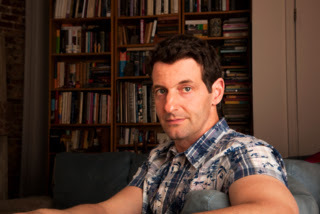
Greg Pierotti
Hometown: Alexandria, VA. A seemingly harmless place that has created a lot of very weird people.
Current Town: New York.
Q: Tell me about Apology.
A: Apology is a play based on hundreds of hours of Apologies that the artist Allan Bridge collected on his home answering machine. The Apology Line, as his project was called, had 5 distinct iterations.
1. In 1980 Bridge put up posters around the worst neighborhoods in New York, which were all pretty bad at that time, challenging criminals to apologize for their misdeeds. "Attention Criminals! you have wronged individuals. It is to individuals you must apologize not to the state, not to god. Apology is a private experiment. It’s sole purpose is to provide a new avenue of communication. It is not associated in any way with any police, governmental, religious, or other organization. Get your misdeeds off your chest. Call Apology." A surprisingly large number wrongdoers called to leave their often weirdly moving apologies on his machine. At this point callers were just lone voices talking into the void.
2. Bridge had a "show" at the new museum in 1983 and felt very dissatisfied with the disconnect between the subjects who were apologizing and the "viewers" who were listening. He decided to cut out the art world as middle man and began editing programs of the best calls. He played the programs on his outgoing message and changed them monthly at first, then biweekly. Now callers to the line could listen to each other, make comments, and even have conversations if they had the patience to wait a month for a response. About ten years before the internet became the thing, Allan created a virtual community of criminals in his apartment.
3. This second period lasted 11 years but was interrupted by a particular caller, Richie the serial killer. Richie called between 1985 and 1990. He completely consumed Allan's attention, and eclipsed all of the other callers. Allan's obsession and identification with Richie almost destroyed the line as well as Allan's marriage. When Allan let on that he and a friend, following a lead from one of Richie's messages, had been out on the streets in Times Square looking for him, Richie stopped calling and was never heard from again.
4. In 1992, in a failed attempt to make some money off the project, Allan created a Zine that featured the most interesting calls of the quarter and some fantastic outsider art solicited from the community. There were ten issues in all.
5. Finally, in 1993, The Line switched to a computerized answering system. Callers could skip over the content and go straight to leaving their apology. Or alternatively, they could spend hours navigating the touch tone menu, selecting from amongst the subject matter they wanted to hear. Ie. For murder press 1, for incest press 2, for complaints and commentary 3, for religious zealotry press 4, for grand and petty larceny press 5 etc.
Allan and his wife Marissa were deep sea divers, and their relationship with diving and with the sea is an important aspect of their story. In 1995, Allan Bridge was killed in a diving accident bringing the line to a close after 15 years wild and rich years.

Q: What else are you working on now?
A: Nothing
Q: Tell me, if you will, a story from your childhood that explains who you are as a writer or as a person.
A: When I was very young I had a toy, I think it was called creepy crawlers? - You would squeeze colored jelly into metal molds and which you would then bake to create different bouncy gelatinous creatures - eye balls and centipedes and so forth. I used to love to smell the chemicals as they baked and I also would poke my fingers inside the little cooker sometimes, which would give me a little shock. I am still drawn to toxic material and enjoy putting my fingers in the metaphorical socket.
Q: If you could change one thing about theater, what would it be?
A: I would somehow make the state value the arts in general and theater in particular so that they created many well funded state theaters across America. I recently watched Pina again and I was just so discouraged by it. Pina Bausch was this incredible genius, and had she been born in the United States, she could never have created the body of work that she did nor could she have gathered that amazing company of artists around her. It wasn't just Pina Bausch and the company that created the work. It was the city of Wuppertal and the German Government. The for profit model and the for profit criteria we have here in the states to support the creation of new theatrical works, can sometimes produce a good play, but it doesn't allow time or space for great art that sheds light on the human heart.
Q: Who are or were your theatrical heroes?
A: Leigh Fondawoski and Moises Kaufman are more colleagues than heroes, but I have learned so much from them about making good theater that I need to mention them here.
The Wooster Group, because they are so theatrical and funny and have such a sense of play, they make me very happy.
Reza Abdoh, Pina Bausch, Shakepeare, Shaw, Pinter, Beckett, O'Neill, Wilde, Williams.
Q: What kind of theater excites you?
A: Theater that understands itself as a unique art form distinct from televisions and film, and that seeks to create the kind of magic that only can be created in live performance. I have certainly appreciated well crafted pieces of theater in the naturalistic living room style, but I wouldn't say I've been excited by them. And I always think, "but i could have stayed home and watched that on TV if they had chosen the right form."
Q: What advice do you have for playwrights just starting out?
A: Start now to connect to other writers directors actors designers who share your aesthetics and values and try to create community with them, try to create work together, and then stick together when you get a little attention.
Q: Plugs, please:
A: Heading To Berkeley Rep in two weeks to develop Apology.
Laramie: 10 years later recently out through DPS. [image error]







Published on July 06, 2012 12:39
July 4, 2012
I Interview Playwrights Part 475: Megan Hart
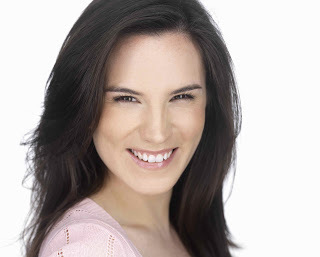
Megan Hart
Hometown: Highland Park, NJ
Current Town: New York, NY
Q: Tell me about This Is Fiction. Is it fiction?
A: This is Fiction is my first play, aside from a couple of 10 minute plays and a one act. So I feel a little funny answering your interview questions since I haven't yet fully grown into the title of playwright. Then again, does that ever happen?? Anyway, its a play I started writing quite a few years ago, mostly as a dare to myself to see if I could or would do it. I've written fiction for a long time, but had never tried to write a play and one particularly slow summer, I decided I would. About a hundred drafts later, nurtured by my amazingly supportive (and pushy) theater company, InViolet Rep, This is Fiction was produced (by InViolet) at the Cherry Lane Studio this past month. In the end, I hope it's a play about family, about the fictions we create about who we are and what our family is, and about what happens when your family and your art collide. As for the 'is it fiction' question, like any true narcissist, I'd say while some of the characters may resemble my relatives, really aren't they all just versions of me?
Q: What else are you working on now?
A: I'm working on a big crazy fiction piece that I've been developing as part of a group of wonderful playwrights and theater makers (and fiction writers): Bixby Elliot, Jennifer Bowen, and Paul Davis. I'm also working on a screenplay.
Q: Tell me, if you will, a story from your childhood that explains who you are as a writer or as a person.
A: When I was in first grade, my school made us all take a computer class, with those big square green-screened early PCs. The idea was to just start typing away and get comfortable with this new-fangled device. It wasn't a writing class--in fact I don't think anyone even read what we wrote. But after the first week, my teacher called my parents and said I spent the entire class contorted in my seat, brow furrowed, chin in hands, agonizing over where to begin, what to say, what story to tell, what words to use. It all felt so IMPORTANT. By the time I was ready to touch the keyboard, the class was over. I don't remember much from that age, but I clearly remember those classes. I'd say it explains my neuroses, the respect I have for putting down words on paper, and my general inability to sit still.
Q: If you could change one thing about theater, what would it be?
A: There's a lot I would change about the business (Showcase contracts can be frustrating. Lets have fewer shows on broadway based on (bad) movies. Why can't artists afford to see other artists' work? Why don't our audiences look like the audiences in any midtown AMC on a Saturday night? More community based theater. More actors of all sizes. Cheaper rehearsal space.), But theater? I don't know. I think it's pretty great, especially because it's always changing whether we want it to or not.
Q: What kind of theater excites you?
A: Theater that makes me think, "I could never have made that!" "God, I wish I wrote that." or "I want to be in that." Really good acting excites me. Theater which is smart, not just clever. Theater which is clearly made with joy, heart, and sweat.
Q: What advice do you have for playwrights just starting out?
A: The advice I keep giving myself: Stop apologizing. Keep writing.
Q: Plugs, please:
A: Check out my blog, www.mousebouche.blogspot.com! Check out my theater company, www.invioletrep.com! Check out my talented sister, www.rebeccahart.net! Check out this fantastic web series that features my amazing husband www.eastwillyb.com! Eat a sandwich at my cousins' cafe www.thecommonschelsea.com![image error]







Published on July 04, 2012 09:42
July 2, 2012
I Interview Playwrights Part 474: John Clancy
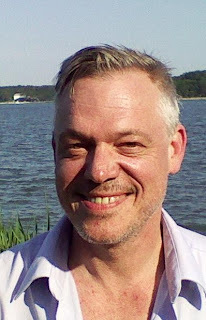
John Clancy
Hometown: St. Louis, MO
Current Town: New York City and Dingmans Ferry, PA. That’s not a misprint, folks. Dingmans Ferry. We lovingly refer to it as Dingbat Junction or Dingleberry Falls, feel free to do the same.
Q: What are you working on now?
A: The Apocalyptic Road Show, the LIT Fund and a new piece for Day of the Living Festival in Los Angeles, currently titled When You Join Us. The Road Show plays The Ice Factory at the New Ohio Theater July 25-28th. It’s a profane cabaret celebrating the end of the world, funded by Creative Scotland. We toured Scotland with it last October and now it’s coming to New York. The LIT Fund is a new funding scheme that came out of The League of Independent Theater. We’ve got about seventy independent theater companies and venues committed to donating a nickel per ticket sold this year into a fund that we’ll use to establish and endowment, create an Emergency Fund and provide unrestricted funding to participating members. When You Join Us I shouldn’t talk about much because I’m still writing it.
Q: How did the NY International Fringe Festival come about?
A: Elena always says it was youth and ignorance. You can blame a lot of things on youth and ignorance, I imagine.
Short version of the story:
We had a big hit in 1995, Americana Absurdum by Brian Parks. One of the Present Company members, Leslie Farrell, had been to Edinburgh and said we would kill over there. We talked to a lot of people and they all said we should go. We ran the numbers and with a cast of ten it was going to cost us 30 grand. That was roughly our annual operating budget. So, that wasn’t going to happen, but I kept talking to people and one morning I’m sitting in our old offices in Hell’s Kitchen, drinking coffee and going through this notebook where I had all of these names and numbers and notes from New York artists who went to Edinburgh and it hit me. We’re all here. August is dead. (Remember when August was dead? Man.) So I picked up the phone, called Aaron Beall who ran Nada on Ludlow Street and asked him why there wasn’t a New York Fringe. He didn’t have a good answer, so our unholy alliance began. He knew a guy, Jonathan Harris, who was involved in launching the first American Fringe Festival in Seattle. The three of us met weekly for a while, basically playing chicken with each other, trying to find reasons why it wouldn’t work, but we couldn’t come up with anything compelling. Elena K. Holy, who was the Managing Director of Present Company back then, joined the conversation to give it some level of fiscal and administrative reality and then we were pretty much committed. And what really happened is that roughly one hundred amazing, selfless, inspired people materialized around us down on the Lower East Side in the blazing summer of 1997 and we all carried this impossible weight for twelve days. That summer is as close to the nonviolent anarchist revolution as I’ve ever experienced.
Q: Tell me about the study guide you're creating for NYTE.
A: So cool. Martin Denton, resident genius of the independent theater territory and I have teamed up to fight crime and…sorry. It’s just that we have these costumes Rochelle sewed up for us, so we keep thinking it would be cool if we went out and fought crime, but we’re older now and all of the good crime happens after midnight and seriously, if I’m up at midnight I’m too drunk to go out and fight crime.
What was the question?
Right.
I took ten plays from www.indietheaternow.com, one each from 1997-2006 and put them in a historical and generally larger context, wrote an intro to each one, asked the writers to write anything they wanted about the plays and then tried to tie it all together. Martin and I have been talking about this for a while, the fact that the history of this extraordinarily creative period in New York City theater isn’t being documented by us, the people creating it. So, we’re trying to change that.
Q: Tell me, if you will, a story from your childhood that explains who you are as a writer or as a person.
A: This is a good one. I was telling this to some friends I was staying with a couple of nights ago, known them for years, Amy Shore and Sanjay Shirke, Heroes of the Fringe, and I’d never told them this.
When I was in kindergarten, I contacted Guillain-Barre, a very rare neurological virus that basically mimics polio. Gradual paralysis, starting with the extremities and then working in towards the trunk. If you were alone in the woods, you’d die because it gets to your lungs and your heart muscles. If it’s diagnosed, then you just ride the bell curve, it gets worse and worse, they put you on a respirator when it’s at its very worst, then you start getting better and recover fully. My memory is that the whole thing lasted about three to four months, might have been longer.
But here’s the cool thing:
I had just started kindergarten when it hit. So I went from being a kid, meaning being wild and unschooled and essentially a savage, into this very strange and regimented environment. It was only kindergarten, but if you think back you can probably remember the difference between nursery school and kindergarten. Nursery school was barely controlled chaos. People would regularly cry and shit their pants and try to stab each other with scissors and the teachers kind of dealt with it all from above. There were no real rules, no more than the ones you were used to at home.
But kindergarten was serious. It was the beginning of socialization. You had to sit at a desk in a straight row and you had to keep sitting there until you were given permission to leave. The circles of nursery school were gone, everyone sitting on the floor in a circle, the pillows of naptime, all of that was put away and everything was straight lines and discipline. And I remember sitting there thinking how strange it was and at that moment a friend of mine, Tommy, broke. He couldn’t handle it. We were all kind of trembling on the edge, but Tommy was the first to break. Bawling, screaming, on the floor, both arms wrapped around the base of the desk, inconsolable. And we were all fighting it, because that kind of thing is highly contagious. We all just wanted to run out of the room and back to the playground, back to nursery school, back home, back to our backyards, away from this weird, serious, quiet room of straight lines and discipline. And the teacher, instead of being understanding and human, had a job to do. So she was trying to be firm and reasonable, you know, “Now, Tommy, get up and sit back down. Come on, Tommy. It’s all right, just sit back in your chair.” Nothing worked, Tommy’s Mom finally came and picked him up, I think. And the rest of us sat there, kind of stunned, but obedient.
And then I’m gone for three or four months. I’m in the hospital, I can’t move, I’m back home, still can’t move, just lying in bed. For some time there I couldn’t even read, couldn’t hold the book and I loved to read. So I’m just sitting there, eighteen hours a day or so, awake and thinking. And when I go back to the classroom after all of this and I’m weak but I can stand and walk, everyone is really nice to me because I was so sick. And class starts. And all of my friends, everyone I knew, started raising their hands and talking in a weird way to the teacher, just a strange, kind of formal, false tone and everyone was quiet while the teacher talked and no one was fidgeting or looking out the window and it blew my tiny little eight year old mind. They had all been broken. They had all been trained and socialized. And I was a smart kid, so I picked it right up and began to mimic the behavior, but it was just an imitation. I knew I had to camouflage my basic little kid craziness and savagery or I wouldn’t succeed in this weird obedient world. But it was just camouflage. And so, in a way, I never really got broken. Which explains a lot, I think. It’s why I got kicked out of high school and grad school, why I could never really work for anyone else for any length of time. On a base level, I accept society but I was never infected by it as a kid.
Q: If you could change one thing about theater, what would it be?
A: Oh, man. I only get one?
I’d wave the wand and it would no longer be Serious and Important and it would be fun and dangerous and sexy. It would be like punk rock or early hip-hop. We’d stop trying to write masterpieces and start writing love letters to each other and ransom notes to our enemies. It would be a lot faster and a little louder. It would be totally cool if your show didn’t actually, in the end, make sense. And every theater would either be a bar or at least have one attached to it
Q: Who are or were your theatrical heroes?
A: The regular rogue’s gallery: Artaud, Brecht, Peter Brook, Judith Malina and Julian Beck, Joseph Chaiken, lots of old and dead men and women. Also Norman Thomas Marshall and Curtiss I’ Cook, Kurt Rhoads and Nance Williamson. Norman has been around forever, he was the lead in The Gorilla Queen, one of the funniest people alive. Curtiss is the first actor I hired in New York, twenty-odd (very odd) years ago. He raised three kids, mostly alone, on an actor’s salary in New York. Kurt and Nance I’ve known since the late 80s and they’re working actors, mostly regional gigs, but they’ve snuck on Broadway once in a while. It’s those working artists that impress me most.
Q: What kind of theater excites you?
A: Exciting theater. Not to be a dick, but I’ve been telling my students lately that there are only two kinds of theater: interesting theater and boring theater. There is no meaningful difference between Broadway theater and regional theater and community theater and university theater. There’s interesting theater and boring theater. And interesting theater is interested in me. Me sitting there with other people watching and listening to it. Interesting theater understands that my time is the most precious thing I have and the world is very, very interesting already, so it tries to be more interesting than the street outside.
Q: What advice do you have for playwrights just starting out?
A: Just write it down.
I used to have that posted above my writing desk at the old Theatorium. Nothing else. Just that, so when I looked up from the page (I used to write exclusively with a pencil in a yellow legal pad) that’s the only thing I saw.
Q: Plugs, please:
A: The Apocalyptic Road Show, www.sohothinktank.org, July 25-28.
Join LIT, www.litny.org
Join the LIT Fund.
[image error]







Published on July 02, 2012 11:17
June 30, 2012
I Interview Playwrights Part 473: David Zellnik
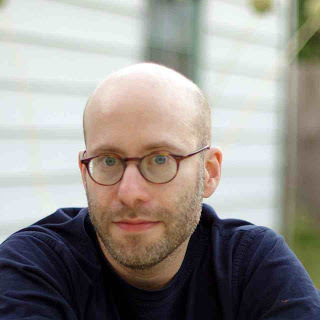
David Zellnik
Hometown: Cherry Hill, NJ
Current Town: Hell’s Kitchen, NYC
Q: What are you working on now?
A: I am finishing the first draft of a new musical (music by my brother Joe) about a New York socialite dressmaker with a drinking problem in China in the 30s on a mission. I am vaguely superstitious about saying too much plot-wise, so I’ll just say: like our last musical YANK!, the new show follows very closely one person’s epic journey over the most important part of her life. Also I’m working on a play commissioned by Blue Coyote Theatre Company that involves a guy who may or may not be a thief, staying with a woman who may or may not be a witch. Also it involves the semi autonomous Russian ethnic enclave of Udmurtia.
Q: Tell me, if you will, a story from your childhood that explains who you are as a writer or as a person:
A: I sometimes think the writer I am is based on the actor I was. Just high school stuff through college, though I majored in Acting at NYU. What it gave me is (I hope) a healthy dread of ever giving an actor something stupid to say, something that’s complicated in the wrong way. It makes me want to make sure they have lines that feel delicious in their mouths. Other stuff from my childhood? As a 12-year-old I fell in love with the musical CATS. I’m not proud.
Q: If you could change one thing about theater, what would it be?
A: I love the collaborative nature of theatre, but sometimes it seems many artists and producers approach a new script as a series of problems to be fixed, rather than a text to be explored. No new play can survive too much of this (nor, might I suggest, could many classics). The problem isn’t bad suggestions, it’s good ones. Take too many good suggestions and the play eventually sucks. I don’t know why exactly this is so, but seems to be. More glibly, those sippy cups of alcoholic drinks at Broadway theatres are so damn annoying, when did they become universal? At Evita, some drunk guy behind me shook his icy Makers Mark the entire show. What happened to the social contract of theatre?
Q: Who are or were your theatrical heroes?
A: My heroes are people doing necessary and exhausting work out in the world...and the theatre artists who bring the wide broken world back into the theatre, people like Caryl Churchill, Tony Kushner, Athol Fugard, Lisa Kron; also those writers just drunk on words, who are rigorous with their craft like Sondheim, Stoppard, Pinter, Shakespeare; also those who sometimes sound goofy but are deeply soulful, like Oscar Hammerstein or William Finn.
Q: What kind of theater excites you?
A: When the lights go down, every time – every time! – I still get so hopeful. Here is a room where anything could happen. So I guess: I get excited when something unexpected, real, or brave happens.
Q: What advice do you have for playwrights just starting out?
A: The thing you think will be a hit? Don’t write that, it probably won’t be and if you want to write a hit, try writing TV or screenplays. On the other hand, the thing that makes you feel like “can I get away with writing this? Really?”... write that. I wanna see it. And don’t talk down to your characters.
Q: Plugs, please:
A: Buy the YANK! original cast album… when it finally comes out.
[image error]







Published on June 30, 2012 07:17
June 28, 2012
I Interview Playwrights Part 472: Lonnie Carter
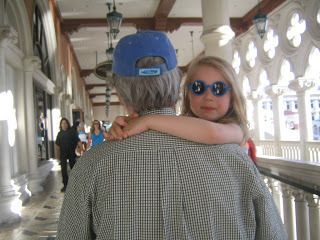
Lonnie Carter
Hometown: Chicago
Current Town: Falls Village, Connecticut
Q: What are you working on now?
A: Lots of new projects including a Tiger Woods play I wrote with a longtime friend, Mac Davis. If you Google Walter A. Davis, you'll see the kind of cat I hang around with for the last 50 years. It's called TRIM and features Howard Stern, Robin Quivers, Jack Nicklaus, Wendi Deng Murdoch, her hubby Rupie, Oprah, Joel Osteen, Elin Nordegren, Earl Woods to name a few luminaries. Did a staged reading last October at New Dramatists and we believe, as Mac puts it, that we've got lightning in a bottle. It's a What-If play, what if Tiger never went back to golf after Elin konked him with a 9 iron. Each of these folks has his/her reason for manipulating Tiger and he, becoming more and more Hamlettian, will have no part in it. O, did I mention that Marilyn Chambers plays a pivotal role? We've sent it everywhere. Anyone want to read it? Happy to send an ecopy.
But also, everywhere I turn, my play THE ROMANCE OF MAGNO RUBIO reappears. The original production by the Ma-Yi Theater Company directed by Loy Arcenas won eight (8) Obies in 2003 and has been done a lot across the country and abroad at festivals - Manila, Romania and soon Singapore. MAGNO THE MOVIE will soon be in production with me sharing screenwriting credit.
Q: Tell me, if you will, a story from your childhood that explains who you are as a writer or as a person.
A: Not a story, but an abiding memory. I recall collecting Jackie Robinson comic books. He was/is my hero. I wanted to be just like him.
Q: If you could change one thing about theater, what would it be?
A: Fewer plays about dysfunctional families/neighbors shouting at each other. I'm reminded of that routine - Is it Monty Python, or does it go back to Peter Sellers and the Goon Show? Someone asks the man in the street what he thinks of all the violence and rape and incest in the media these days and he says, It's just awful. I get quite enough of that at home.
Q: Who are or were your theatrical heroes?
A: Graham Greene whom we don't usually think of as a playwright, but his play THE POTTING SHED is terrific. And he's such a terrific writer across the board. Shirley Hazzard wrote a memoir GREEN ON CAPRI. And is she a writer as well! Jean Genet. I saw a production of THE MAIDS played by three men, which is the way Genet wanted it done. Produced by New Stage in Pittsfield Massachusetts. Unbelievably great and directed by my friend Tom Gruenewald. (I had to remind myself that I wasn't in the best theaters in Chicago, New York or London.) James Joyce and his play EXILES. Lorraine Hansberry and A RAISIN IN THE SUN. How about someone living? My Yale pals, David Epstein, Bob Auletta, Bob Montgomery. My Chicago budds, Doug Post, Charles Smith, Steve Carter, Gloria Bond Clunie and the Victory Gardens Ensemble and every New Dramatist and Playwrights' Center writer ever.
Q: What kind of theater excites you?
A: Refer to the above. More specifically, theater which I don't leave saying - I AREADY KNEW THAT!
Q: What advice do you have for playwrights just starting out?
A: Go be a Mad Man/Woman.
Q: Plugs, please:
A: The Falls Village Marshmallow Company whose motto is NO ART, JUST FLUFF! Betsy Howie, owner, operator, CEO, CFO, Chief Cook and Marshmallow Tray Washer.
Self-plugs? My column FIST BUMP, an etymologically-centric rant/riff/rap I'm getting around. THE ODYSSEY CYCLE, a jazz album by Russell Kaplan, about to come out on the theme of Homer's The Odyssey. I have a spoken word TIRESIAS ADVISES CASSIUS CLAY/MOHAMMED ALI over one of the numbers. Nitroglycerine.
lonniecarter.com







Published on June 28, 2012 10:12
June 27, 2012
I Interview Playwrights Part 471: Sarah Schulman
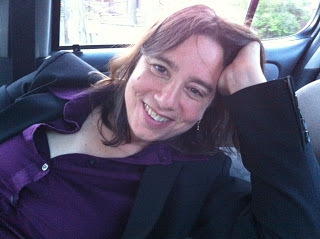
Sarah Schulman
Hometown: New York City
Current Town: New York City
Q: What are you working on now?
A: A new play about sexual harassment and race.
Q: Tell me, if you will, a story from your childhood that explains who
you are as a writer or as a person.
A: Like many of my generation I was handed The Diary of Anne Frank at an early age and it taught me that girls could be writers.
Q: If you could change one thing about theater, what would it be?
A: Right now the standard is to reflect back to producers and their identified audiences, their perceptions of themselves. I would change this so that the standard for theater would be to expand what we understand about being alive.
Q: Who are or were your theatrical heroes?
A: I must admit that Cherry Jones has inspired and frustrated me for many years.
Q: What kind of theater excites you?
A: Work that grapples with something that matters while expanding the kinds of experiences, points of view and characters seen on the American stage.
Q: What advice do you have for playwrights just starting out?
A: Don't do it.
Q: Plugs, please:
A: Most recent book: The Gentrification of the Mind:Witness to a Lost Imagination (U of California Press)
[image error]







Published on June 27, 2012 06:46
June 26, 2012
I Interview Playwrights Part 470: Micheline Auger
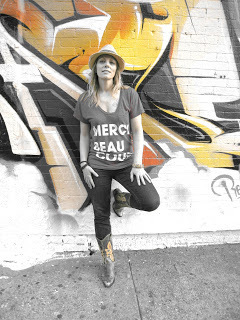
Micheline Auger
Hometown: Sacramento, CA.
Current Town: NYC
Q: Tell me about American River:
A: I wanted to write the Great American Love Story. It's also a grieving. And a comedy. It's a grievedy.
Q: What else are you working on now?
A: Right now I'm curating the Write Out Front Playwright Installation happening in the storefront of the Drama Book Shop August 13th - Sept. 4th. Some 70 playwrights will write new work in the storefront while the screen view of their computer will be projected on the wall behind them, visible to the street. People can engage, support and follow the playwrights via twitter, FB and the Write Out Front Website. They can go to their shows, follow their careers and when they win a Tony, Lily or Academy Award they can say I knew them when... Tina Howe called it "Inspired insanity!"
Q: Tell me about Theaterspeak.
A: I started Theaterspeak because I come from a small town and even though my family went to the theater and my dad and grandfather were writers, I didn't really view myself as a creative person even though I played the piano, danced and acted. Being a creative person or being in the theater wasn't really viewed as an option. In a way, I think it was viewed as being egotistical. Instead the M.O. was "most people are lucky not to hate their jobs and do what they love to do on the side" so get a job in human resources or something. I had also been told that it takes ten years to make it, so when I was acting or beginning writing, I didn't really put myself out there as much. So Theaterspeak is my attempt to reach out to artists who have beliefs that don't serve them and connect them with artists who are creating their own work, their own lives in inspiring ways. It's a way to build community, to encourage people to do what they want no matter what, to believe in themselves and to spark innovation and new creation. And it's also a big thank you to all the people (like you, Adam) who have shared information, resources and their talent.
Q: Tell me, if you will, a story from your childhood that explains who you are as a writer or as a person.
A: Um, well I talked to myself when I was a child. It was the way I reasoned things out so, in a way, I think that was the beginning of playwriting and finding creative modes to help navigate the world. I'd also stay in the car when my mom would go grocery shopping, and I'd find pieces of paper or loose change in the back seat and make them into characters and do little scenes between them. Then, in high school, my step-brother died, and I wrote a piece about it and performed it for my acting class. I didn't think I was a writer, I didn't think it was a solo show. It was just the human instinct of story telling with people in your community to create connection.
Q: If you could change one thing about theater, what would it be?
A: I'm certainly not the first person to say this but I'd make it more affordable to produce and more affordable to see. I'd also increase the avenues from which we collect our playwrights and theater artists.
Q: Who are or were your theatrical heroes?
A: All the theater artists and companies that I saw growing up in Sacramento and LA doing their work despite the challenges internally and externally.
Q: What kind of theater excites you?
A: I have pretty eclectic tastes in things but ultimately I'd say theater that is inclusive and is trying to have a conversation with a wide audience.
Q: What advice do you have for playwrights just starting out?
A: Keep trying whenever you fail. Embrace others.
Q: Plugs, please:
A: Come say hi to me and the Lesser American's who are producing my play American River at Theater for the New City July 12 - 22. You can get info and tix here: http://www.lesseramerica.com/box-office/
If you're a playwright who wants to participate in Write Out Front, you can get info and application here: http://theaterspeak.blogspot.com/p/write-out-front-playwright-happening.html.
[image error]







Published on June 26, 2012 08:46
June 21, 2012
I Interview Playwrights Part 469: Greg Pierce
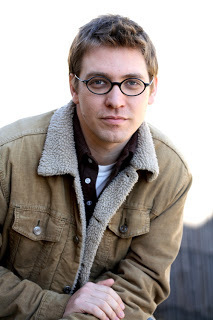
Greg Pierce
Hometown: Shelburne, Vermont
Current Town: NYC
Q: Tell me about Slowgirl.
A: Hm...it's a two-hander: uncle and niece. What do I say? It takes place in Costa Rica, way out in the jungle. Snakes are mentioned. The niece is trying to escape from something really awful that's just happened. Her loner uncle is doing the best he can to help her out but he's got his own stuff...I always feel like I'm saying too much, Adam. Come see! It's at Lincoln Center's Claire Tow theater until July 15th. Anne Kauffman directed it and she's a wizard. Željko Ivanek and Sarah Steele are killer. Seriously—I'm not just saying that because it's my play. What else...I wrote Slowgirl a while ago, did a reading in my friend's living room, and then put it in a drawer for a long time, thinking it might live there forever. So I'm really happy that it's now living on the Upper West Side, in air-conditioning.
Q: What else are you working on now?
A: I'm working on a three-part musical called The Landing with John Kander. We just did a lab production at the Vineyard Theatre, which Walter Bobbie directed masterfully. We're in discussion with the Vineyard about the next step. John and I are hoping to have a first draft of a new musical by the end of summer. I'm also working on a new play, and the libretto for an opera based on Thomas Mallon's novel Fellow Travelers (Gregory Spears is writing the music, Kevin Newbury is directing.) And I write fiction—mostly short stories, so that's ongoing.
Q: How does your writing process differ when writing theater vs. fiction?
A: The writing process is different for each project so there's no theater vs. fiction division in my head. Some things happen quickly, some don't. I tend to think about something for a long time, then write a quick first draft, then a slow and painful second draft, and then who knows? But it's always different.
Q: If you could change one thing about theater, what would it be?
A: I wish it weren't so expensive to produce an Off-Broadway play. I wish all hard-working theater folks could make a living at it, and get insurance. I wish I could see a new Will Eno play every weekend. I wish jangly bracelets were illegal. I wish more people would go to new plays. I wish we could do away with all theater competitions, and just reward each other by showing up.
Q: Who are or were your theatrical heroes?
A: I'm listing writers only, though I have lots of non-writer theater heroes like the set designer Rachel Hauck. But writers only: Will Eno, Pinter, Tom Donaghy, Annie Baker, Irving Berlin, Chekhov, Slick Rick, Doug Wright, Conor McPherson, Strindberg, Kenneth Lonergan. Lots of folks, but that's who's on my mind right now.
Q: What kind of theater excites you?
A: Plays that have excited me this year: Denis O'Hare and Lisa Peterson's An Iliad, David Adjmi's 3C, Will Eno's The Realistic Joneses, Amy Herzog's Belleville. I don't know what these plays have in common, if anything, or why they excited me. They seemed like magic. Cheesy word, but how else do you say it? I left those plays thinking, "Wait, someone wrote that?" which is weird, seeing as I'm a writer. I like plays that remind me that the world is even bigger.
Q: What advice do you have for playwrights just starting out?
A: Writing plays is a great thing to do because it's a great thing to do. It's easy to get all freaked out about where you fit in on some dumb spectrum but what's the point, you know? It's great to write something and do a reading in your common room with your friend, or to put up a show in your storage unit, or to just go to other people's plays for a while. Easier said than done, but it's good to be proud of where you are. Starting out is most excellent. If you've written 90 plays: also excellent. There's room for all of it. I'm not qualified to give advice but since I've been asked I'd say: just participate. In whatever way feels right to you. The only comfort in playwrights being wildly underappreciated in this day and age is that none of us is "making it" so we might as well just write what sounds good to us and support each other, right?







Published on June 21, 2012 07:21





















